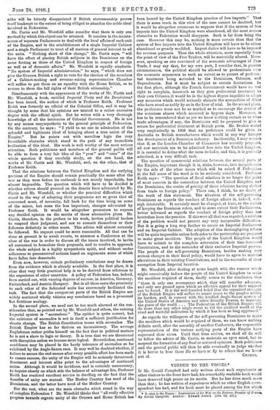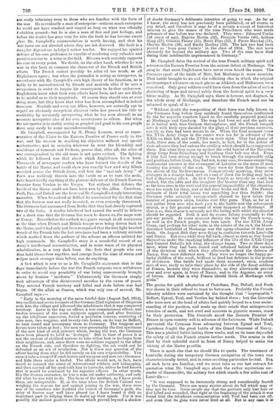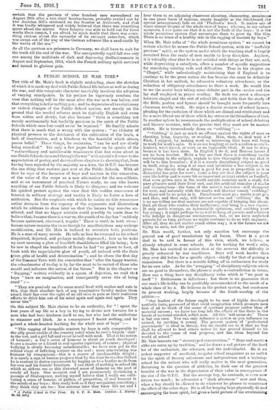VERDUN TO THE VOSGES.* Is Mr. Gerald Campbell had only
written about such experiencee as other visitors to the front have had, his remarkably readable book would have deserved high praise on its merits. But he has done much more than that ; he has written of experiences which no other English corre- spondent has had, and his book must be placed among the few which • radius to the Vosgee Impressions of the War on the Fortress Frontier of Franc* By Gerald Campbell. London: Edward Arnold. Ms. Bd. net.] are really informing even to those who are familiar with the facts of the war. He is evidently a man of enterprise—without much enterprise he could not have reached and stayed so long on what was officially ferbidden ground—but he is also a man of fine and just feelings, and before the reader has gone very far into the book he has become aware 'that Mr. Campbell's commendation is worth having, and that his stri:tures are not directed where they are not deserved. His fault is a ikin; for digressions indulged rather too far. We enjoyed his spirited defence of his own profession as capable of rendering very valuab:e and positive service to n army in the field. His own work certainly supports Ins case at every point. We doubt, on the other hand, whether he was wise in this book to compare the character of the French and British efforts. The French cannot possibly be admi cd too much, as all Englishmen agree ; but when the journalist is acting as interpreter, in accordance with Mr. Campbell's own high theory of his functions, he is liable to be misunderstood by friends and neutrals alike if he uses a comparison in order to inspire his countrymen to fw ther endeavour. Englishmen know what their own efforts have been, and are not likely to be misled as to their magnitude. Of course they should aim at ever doing more, but they know that what has been accomplished is indeed Immense. Neutrals and even our Allies, however, are naturally apt to regard an obviously competent observer (who has proved his title to credibility by accurately interpreting what he has seen abroad) as an accurate interpreter also of his own countrymen to others. But when the interpreter is in reality acting as prophet and goad to his own people there may easily be some misunderstanding.
Mr. Campbell, accompanied by M. Fleury Lemur°, went as repre- sentative of the Times to the Eastern Frontier of France early in the war, and his success in reaching his objective without any special autherizatiom and in securing wherever he went the friendship and confidence of Generals and Prefects, proves that, after all, the office of war correspondent in the old sense is not quite extinct. The fighting which ho followed was that about which Englishmen knew least. Thousands of newspaper readers who have learned the details of the battle of the Marne, and could show you exactly how and why Kluck marched across the British front, and how the "taxi-cab Army" of Patis was suddenly thrown into the 1 attle so as to turn the scale, have heard hardly anything of the glorious defence of the French Eastern Frontier from Verdun to the Vosges. Yet without that defence the battle of the Manic could not have been won by the Allies. Castelnam, loch, Pau, and Dubail are the heron of Mr. Campbell's deeply interesting narrative. When he arrived at Belfort he ascertained for the first time that the fortress was not really invested, or even seriously threatened. The Germans had announced from Berlin that they had already captured two of the forts. A similar falsehood had caused the world to believe for a short time that the German line must be drawn on the maps west of Nancy. Nevertheless the outlook was grave enough in all conscience at the time when French and British troops were being driven back to the Marne, and it had only just been recognized that the first light-hearted Inrush of the French into the lost provinces had been a military mistake which marked down the authors of the scheme as officers unfitted for high commands. Mr. Campbell's story is a wonderful record of an Army's intellectual reconstruction, and in some genets of its physical rehabilitation, in a very dark hour. One feels that people who can thus hold themselves together, and emerge from the time of storm and eclipse much stronger than before, can do anything.
A fact which is now to us is Mr. Campbell's statement that in the days immediately before the war the French outposts wore withdrawn In order to avoid any possibility of war being unnecessarily brought about by frontier "incidents." Unfortunately the Gormens simply took advantage of this disinterested sacrifice to the cause of peace. They entered French territory and killed and stole before war had begun. Of tho affair at &tame, which was only one of several, Mr.
Campbell says :—
"Early in the morning of the same fateful date (August 2nd, 1914), two cyclists and seven troopers of the German 22nd regiment of Dragoons rode into the village and informed the inhabitants that it was conquered territory. Later in the day an officer, a non-commissioned officer, and twelve troopers of the same regiment appeared, and after breaking up the telephone apparatus, forced a provision convoy, consisting of nine mon, two waggons, and twenty-two horses, on its way to Bolforte to turn round and accompany them to Germany. The waggons and horses were taken as loot ; the mon wore presumably the first specimens of the now kind of civil prisoner which, during the war, the Germans have been pleased to label as 'hostages.' But in time of peace it is not the custom of civilized nations to take either loot or hostages from their neighbours, and, since there were no soldiers engaged in the affair on the French side, and therefore no fighting, the act could not be defended as an act of retaliation. Nor is there any question of the officer having done what he did merely on his own responsibility. You cannot take a troop of F: ench hereon and waggons and mon into Germany and hide them under a buahol. The officer would not, in feet, have dared to commit the crime of international robbery and kidnapping, and then carried off his spoil with him to barracks, unless ho had known that it would be condoned by his superior officers. In other words, Rise the Roman centurion, he was a man sot under authority, and only did what he was told to do. The facts of the incident, as I have given them, are indisputable. If, at the time when the British Cabinet was weighing the reasons for and against joining in the war, there wore any of its members who doubted the extent of Germany's guilt, the story of Selves may well have played (as I have hoard it did) an Important part in helping them to make up their minds. For it was possibly the earliest positive evidence which proved beyond a shadow
of doubt Germany's deliberate intention of going to wan As far as I know, the story has not previously been published, at all events in any detail, and therefore it may be of a certain amount of historical interest to give the names of the nine Frenchmen who wore made prisoners of war before war was declared. They were : Edouard Voelin (58 years of age), Enema Mattin (52), Francois Vorthe (60), Isidore Skup (57), Westin Floury (55), Henri Fega (53), J. Pierre Marchal (51), Charles Martin (29), and Emile Mouhay (29). The last two had been passed as ` bons pour Parma° in the class of 1914. Tho rest were obviously far beyond the military ago. Two of the nine have died during their indefensible imprisonment in Germany."
Mr. Campbell dates the revival of the true French military spirit and science on the Eastern Frontier from the serious defeat at Morhange. We smaghie that most Englishmen have never even heard the name. The Germans speak of the battle of Metz, but Morhange is more accurate.
That battle brought to an end the rollicking dart in which the original uncircumspeet advances on Buell places as Altkirch and MtiLauson wore conceive:1 Only great soldiers could have risen from the ashes of such a shattering of hope and turned safely from the festival spirit to a very bitter reality. As Mr. Campbell says, them is honour, not disgrace, in the whole story of Morhange, and therefore the French need not be ashamed to speak of it :—
" Without doubt the composition of their force was fully known to the Germans long before they suddenly found themselves confronted by the far superior numbers based on the carefully prepared positions at Morhango and Ss.arburg. The trap had boon sot and the path up to it baited with true German thoroughness and the French romped into it with their eves dazzled by the glare Of their previous successes, exactly as they has been meant to do. When the fatal moment came the X.Vtli Army Corps in the centre wore too far in advance of the XXelt on their loft and the XVIth on their right. Thoy had plenty of dash, these men of the south, too much, in fact, for in the ardour of their advance they had outrun the artillery which should have supported them. But when they came up agninst the solid barrier of the Bavarian, Army Corps from Strassburg and Saarburg their bolt were shot. Evem if they had Loon strong enough to break through the impossible odds and positions before them, they had not, in any ease, the same compelling sentimental interest in the reconquest of Lorraine as the mass of men forming the armies of the east. They wore far from their homes on the shores of the Mediterranean. Comparatively speaking, they were strangers in a strange land, and on some of them the feeling may have had a depressing offeet. At feet tIvey fought aa bravely as could be wiahed, but the odds and the slaughter (far heavier than any that had so far boon seen in tho war) and the general impossibility of the situation were too much for them, and at last they broke and fled. The French estimate of their total losses was something lees than 10,000: the Germans (who certainly exaggerated) claimed to have taken that number of prisoners alone, besides over fifty guns. That, as far as I can gather from men who took eart in the battle and the subsequene retreat, is a fair general account of what happened at Morhango. II that is so, then shame is certainly not the feeling with which the disaster should be regarded. Both it and its causes belong essentially to the pro-war period. At some moment during the war the French army, as well as the French people, was born again. For the XVth Army Corps, and perhaps for other units in the armies of the east, the blood- drenched battlefield of Morhango was the agony-chamber of that new birth. Oct August 20th they were flying in confusion towards Luneville and Nancy. But oven while they foil back, almost as soon as the found themselves under the steadying influeace of the 75's of the XXtli Corps and General Dubail's loft wing, the change began. Two or throe days later, when they had been rested and reformed behind the curtain of the divisions with which they afterwards shared the defence of Nancy, they were different mon. They were no longer the happy-go- lucky children of tho south, brilliant in deed but deficient in the power of resistance. One battle had made them seasoned, stern, resolute men of war, ready to take their place by the side of the finest soldiers of Franco, because they were themselves, as they afterwards proved over and over again, in front of Nanny, and in the Argonne, an army of heroes. And that is why France should think of 'Morhange with pride."
The genius for quick adaptation of Castelnau, Pau, Dubail, and Foch Was shown in their refusal to trust to fortresses. Probably the French infantry soldiers were sustained by the thought that "impregnable Belfort, Epinal, Toul, and Verdun lay behind them ; but the Generals who were now at the head of affairs had quickly leaped to a true under- standing of the position, and made up their minds that unimpressive
trenches of earth, and not steel and concrete in gigantic masses, must be their protection. The Generals saved the Eastern Frontier of Franco in open country well in advance of the fortresses. While Dubail prevented the Cormans from advancing between Epinal and Tout, Castelnau fought the great battle of the Grand Couronn° of Nancy. This was a pitched battle lasting throe weeks, and on its issue depended the safety of all the French armies further north. The armies in the East by their splendid stand in front of Nancy helped to make the victory of the Marne peesible.
There is much else that we should like to quote. The treatment of Luneville during the temporary German occupation of the town was characteristically brutal, and in some revolting particulars bestial. But all such facts are familiar, and we must take as our last extract for quotation what Mr. Campbell says about the rather mysterious sur- render of Ma,nonvillor, the solitary fort which stands a few miles east of Lunevil/e :—
"It was supposed to be immensely strong and considerably feared by the Germans. There are many stories about its fall which may or may not be true. Some people say that the garrison only lost four or five killed and wounded, that right at the beginning of the attack it was found that the telephone communication with Toni had been cut off, and even that its guns were never fired at all. But in any case it is. certain that the garrison of nine hundred men surrendered on August 28th after a two days' bombardment, probably carried out by two Austrian 305's stationed on the frontier • at Avrie.ourt, and that it was loudly whispered and widely believed that there was something queer about the matter. Since Longwy was able to hold out for throe weeks there cannot, I am afraid, be much doubt that there was some- thing curious about the surrender of its stronger sister-fort, which was swept out of the way of the German advance like a sand-castle by tho waves of the seas" As all the garrison WO prisoners in Germany, we shall have to wait for the truth till the end of the war. The unexpectedly rapid fall was only one among the multitude of dark and depressing disillusionments in
August and September, 1914, which the French military spirit survived and turned to glorious gain.




































 Previous page
Previous page